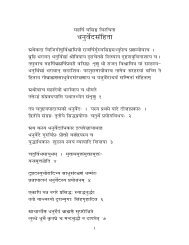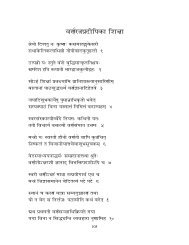- Page 1 and 2: Chapter 1 PQXP #ND€P $DV,QP $L J0
- Page 3 and 4: VYH5 D WX V QDPDLQ NPD5L> F SZN{ SZ
- Page 5 and 6: \H D WX \Df NP5 8WDQDP K N,LW5WP WW
- Page 7 and 8: 1.62. (Are) Svarokisha, Auttami, Ta
- Page 9 and 10: $UDHJD! VY5LVDZD5] FWXY5 5]W $\X
- Page 11 and 12: 1.103. A learned Brahmana must care
- Page 13 and 14: Chapter 2 LY´L¯! VHLYW! VL¯U{ LQ
- Page 15: #WG{ GH]¾V8W6\ VND]DG{ $€M1PQ! 6
- Page 19 and 20: 2.59. They call (the part) at the r
- Page 21 and 22: 2.78. A Brahmana, learned in the Ve
- Page 23 and 24: L1²\D>D WX VYH5 D \ HN @ULW L1²\P
- Page 25 and 26: 2.118. A Brahmana who completely go
- Page 27 and 28: FL‘>DH G]P,6Z6\ UDHLJ>DH DLU>! L
- Page 29 and 30: \ZD ^)DH $ O! Ò, X \ZD JD(U{ JLY F
- Page 31 and 32: 2.177. Let him abstain from honey,
- Page 33 and 34: SUD { PXR6\ $L PXRDH ©U6Z6\ #7\ F
- Page 35 and 36: 2.217. On returning from a journey
- Page 37 and 38: 2.237. By (honouring) these three a
- Page 39 and 40: Chapter 3 T{L¥]G{ $L%GN F\ JXUD(
- Page 41 and 42: Y O, HQ S,W6\ LQ!ÏDV SKW6\ F W6\D
- Page 43 and 44: 3.38. The son born of a wife, wedde
- Page 45 and 46: MDP\DH \DLQ JHKDLQ ]S17\¾LWS8LMWD!
- Page 47 and 48: \6PDW ¥\DH $3\DÍLP>DH `DQHQ $¸HQ
- Page 49 and 50: LY D WS! VPH X ÕW LY¾PXRDL” X
- Page 51 and 52: $ V NHYO XrH \! SF7\D7PNDU>DW \`L]
- Page 53 and 54: 3.137. Know that he whose father kn
- Page 55 and 56: $NDU>H SLU7\‹D PDWD LS¥DHU{ JXUD
- Page 57 and 58: Y,Ø\ $1[DH QYWH! ND>! ÐH! LÏ¥,
- Page 59 and 60: 3.197. The Somapas those of the Bra
- Page 61 and 62: $DF0\ G.SUDY7\ L¥U{ $D\0\ ]Q(U{ $V
- Page 63 and 64: \DYG{ PD Y7\¸ \DYG{ $ÌL1W YD*\WD!
- Page 65 and 66: 3.257. The food eaten by hermits in
- Page 67 and 68:
\ZD F #Y $SU! S@! S8Y5S@DG{ LYL] \W
- Page 69 and 70:
4.10. He who maintains himself by p
- Page 71 and 72:
$DVQ $]Q ] $LS Q $F5\HW 4.30. Let h
- Page 73 and 74:
Lh2WU6N‰7\ ›UHW NDÑ ODHÑ S¥
- Page 75 and 76:
4.69. The morning sun, the smoke ri
- Page 77 and 78:
#WG{ LYG1WDH LY´DVDH ÂDÚ>D ÂÚY
- Page 79 and 80:
4.110. A learned Brahmana shall not
- Page 81 and 82:
4.129. Let him not bathe (immediate
- Page 83 and 84:
4.148. By daily reciting the Veda,
- Page 85 and 86:
Q NGD LFG{ L´MH W6PDG{ LY´DQ $YJX
- Page 87 and 88:
LKU^\P $D\XU{ $¸ F 8U{ JD(] F $3\D
- Page 89 and 90:
4.208. Nor that at which the slayer
- Page 91 and 92:
4.227. Let him always practise, acc
- Page 93 and 94:
4.247. He may accept from any (man)
- Page 95 and 96:
Chapter 5 ÍX7YD #WDQ ? \DH [PD5Q
- Page 97 and 98:
5.20. He who unwittingly partakes o
- Page 99 and 100:
$DH ;\! S]YDH Y@DV LW\5 ! SL@>V WZD
- Page 101 and 102:
VLS^IWD WX SXÇ H V»PH LYLQYW5WH V
- Page 103 and 104:
L¥UD¥P $DÕU{ $D]D(FP $DFD\H5 VL6
- Page 105 and 106:
5.99. (At the end of the period of
- Page 107 and 108:
ND(]H\ $LYN\DHU{ A (! NeWSDQDP $LU
- Page 109 and 110:
5.140. Sudras who live according to
- Page 111 and 112:
PWH W5LU VD){Y, Ò, ÂÚF\H5 9\YL6Z
- Page 113 and 114:
6.10. Let him also offer the Naksha
- Page 115 and 116:
6.30. (As well as those rites and t
- Page 117 and 118:
6.50. Neither by (explaining) prodi
- Page 119 and 120:
6.70. Three suppressions of the bre
- Page 121 and 122:
FWXL 5U{ $LS F #Y #W(U{ LQ7\P $DÍL
- Page 123 and 124:
\6\ ¾VDGH S°D Í,U{ LYM\] F SUD
- Page 125 and 126:
]XLFQD V7\V[HQ \ZD]DÒ $QXVDLU>D ¾
- Page 127 and 128:
7.51. Doing bodily injury, reviling
- Page 129 and 130:
VYH5> WX ¾\¤HQ LJLU¨J VPDÍ\HW #
- Page 131 and 132:
7.91. Let him not strike one who (i
- Page 133 and 134:
7.111. That king who through folly
- Page 135 and 136:
S¥ ]DN W>DQD F FP5>D Y(GO6\ F P1P\
- Page 137 and 138:
SU6SULYÇDQD WH D F VPXSDM5QP N1\
- Page 139 and 140:
\GD WX 6\DW SLU@,>DH YDKQHQ EOHQ F
- Page 141 and 142:
7.192. On even ground let him fight
- Page 143 and 144:
7.212. Let the king, without hesita
- Page 145 and 146:
Chapter 8 9\YKDUDQ LGf@XV WX ÂDÚ>
- Page 147 and 148:
\6\ ]8²V WX NeÇWH UD`DH [P5LYYHFQ
- Page 149 and 150:
8.41. (A king) who knows the sacred
- Page 151 and 152:
JLK>! SXL¥>DH PD(OD! @¥ LY= ]8²
- Page 153 and 154:
VDØ\H $QW YGQ SD](U{ E;\WH YDÇ>(U
- Page 155 and 156:
8.101. ’Marking well all the evil
- Page 157 and 158:
NDPDG{ G]JX> S8Y ‘DH[DW WX L¥JX>
- Page 159 and 160:
8.141. Or, remembering the duty of
- Page 161 and 162:
$GDWLU SXQU{ GDWD LY`DW¾N‰WDY ?>
- Page 163 and 164:
8.181. He who restores not his depo
- Page 165 and 166:
LY‘\DG{ \DH [Q LN LFG{ J},\W NeOV
- Page 167 and 168:
#WG{ G^ILYL[ Ne\D5G{ [DLP5N! SLZY,S
- Page 169 and 170:
8.241. (For damage) in other fields
- Page 171 and 172:
8.262. The decision concerning the
- Page 173 and 174:
NH]H X J}WDH K6WD( FHG\HG{ $LYFDU\Q
- Page 175 and 176:
8.303. That king, indeed, is ever w
- Page 177 and 178:
8.323. For stealing men of noble fa
- Page 179 and 180:
8.344. A king who desires to gain t
- Page 181 and 182:
N1\DP M1W,P 7N‰Ð Q LN LFG{ $LS G
- Page 183 and 184:
$JX»H @L¥\D Y(=\H ]8²D YD ÂDÚ>
- Page 185 and 186:
D^IS8>D5LQ \DQDLQ WD\ GD3\DLQ VDUW!
- Page 187 and 188:
Chapter 9 SXÇ 6\ LÒ\D] F #Y [PH5
- Page 189 and 190:
;\D\7\LQÐ \W LN LFW SDL>€DK6\ FH
- Page 191 and 192:
WW ¾D`HQ LYQ,WHQ `DQ LY`DQYHLGQD $
- Page 193 and 194:
L´W,\P #NH ¾MQ P1\1WH Ò, X WL´G
- Page 195 and 196:
9.81. A barren wife may be supersed
- Page 197 and 198:
WZD LQ7\ \WH\DWD Ò, SXVD( WX N‰W
- Page 199 and 200:
9.121. The representative (the son
- Page 201 and 202:
SS¸DH JX>(! VY( 5! SX¥DH \6\ WX G
- Page 203 and 204:
\Df] OP $D½DHLW Ne3OY(! VWUQ MOP W
- Page 205 and 206:
\ #WH $L LKWD! SX¥D! ¾VšDG{ $1\E
- Page 207 and 208:
$Q $]D( Š,E SLWWD( MD7\1[ EL[UD( W
- Page 209 and 210:
8W VPDÜ\ F #Y UDMD UDÐDW LQYDU\HW
- Page 211 and 212:
9.241. For (such) offences the midd
- Page 213 and 214:
WH D GDH DQ $L 2\D3\ 6YH 6YH NP5L>
- Page 215 and 216:
9.282. But he who, except in a case
- Page 217 and 218:
1²6\ $N56\ YD\DH] F \P6\ YÇ>6\ F
- Page 219 and 220:
9.323. But (a king who feels his en
- Page 221 and 222:
Chapter 10 $[,\,UV ¥\DH Y>D5! 6YNP
- Page 223 and 224:
10.20. Those (sons) whom the twice-
- Page 225 and 226:
10.40. These races, (which originat
- Page 227 and 228:
10.60. Even if a man, born in a gre
- Page 229 and 230:
10.80. Among the several occupation
- Page 231 and 232:
Y(=\YL¢P $QDLWÑQ ÂDÚ>! 6YH SLZ
- Page 233 and 234:
[D1\H $ÐP LY]D ]X/N LY] ND D5S> $Y
- Page 235 and 236:
Chapter 11 VD1WDLQN \Ø\PD>P $;YJ V
- Page 237 and 238:
\G{ [Q \`],ODQD GHY6Y WG{ LY¨U{ EX
- Page 239 and 240:
L1²\DL> \]! 6YJ5P $D\X! N,LW ¾MD!
- Page 241 and 242:
11.59. Slaying kine, sacrificing fo
- Page 243 and 244:
L¥YDU ¾LWUDHD YD VY56YP $YLM7\
- Page 245 and 246:
JK,7YD PXVO UDMD VN‰¬i K1\DW WX
- Page 247 and 248:
NDPWDH UHWV! VHN ÊW6Z6\ L´M1PQ! $
- Page 249 and 250:
11.140. But for destroying one thou
- Page 251 and 252:
11.160. He who desires to be pure,
- Page 253 and 254:
11.180. He who associates with an o
- Page 255 and 256:
11.200. To eat during a month at ea
- Page 257 and 258:
11.220. He who, concentrating his m
- Page 259 and 260:
N,WD] F $LK SWJD] F S]Y] F Y\DLV F
- Page 261 and 262:
\ZD $ÏPH[! ‘WXUD- VY5SDSDS QDHGQ
- Page 263 and 264:
12.10. That man is called a (true)
- Page 265 and 266:
YHGDB\DVV WSDH `DQ ]D(FP L1²\LQ€
- Page 267 and 268:
# VY5! VPXL¬ÐV L¥ ¾NDU6\ NP5>!
- Page 269 and 270:
YD1WD=\X/NDPXR! ¾HWDH LY¾DH [PD5W
- Page 271 and 272:
12.90. He who sedulously performs a
- Page 273 and 274:
G] $YUD YD SLU [P SLUN/S\HW ¥< $YU


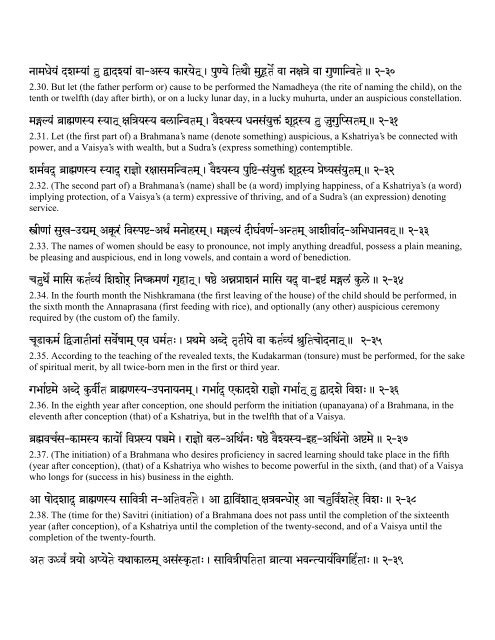
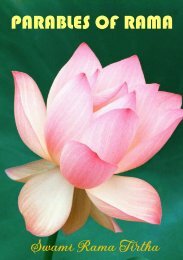
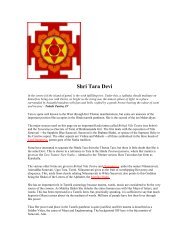
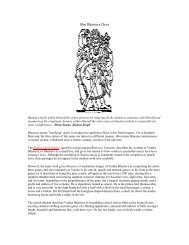
![[ Home ] [ Up ] Books Contact us Immortal Promise ... - Hindu Online](https://img.yumpu.com/9577792/1/190x245/-home-up-books-contact-us-immortal-promise-hindu-online.jpg?quality=85)
